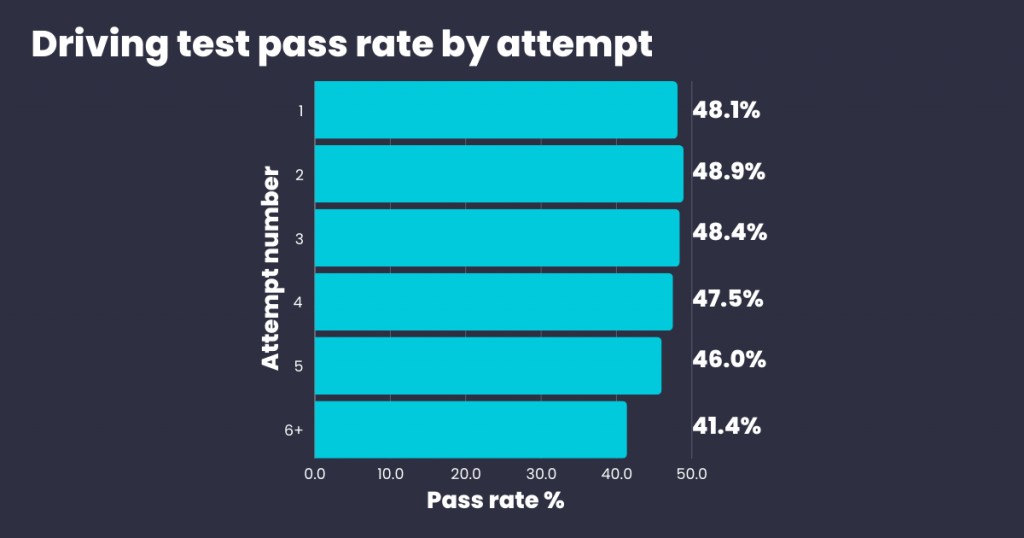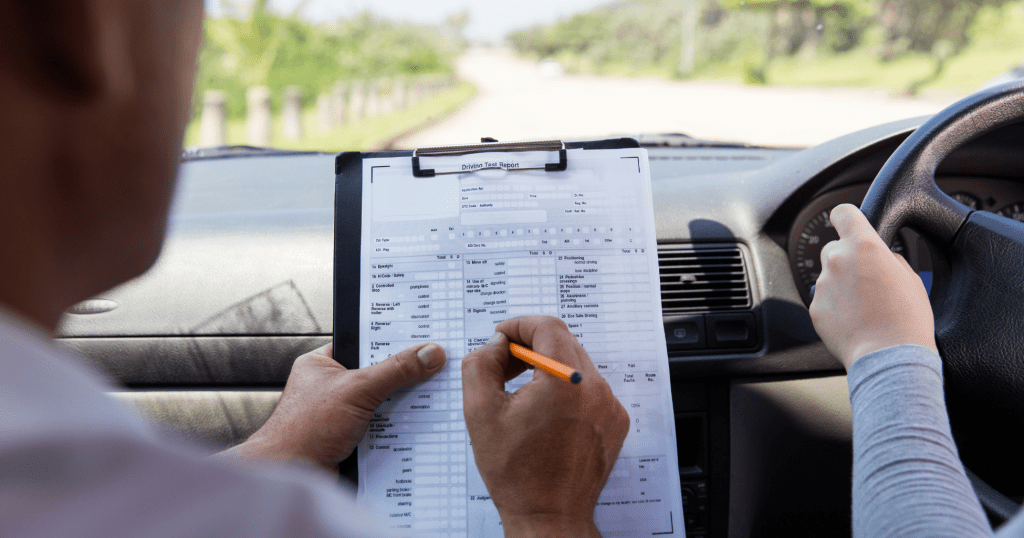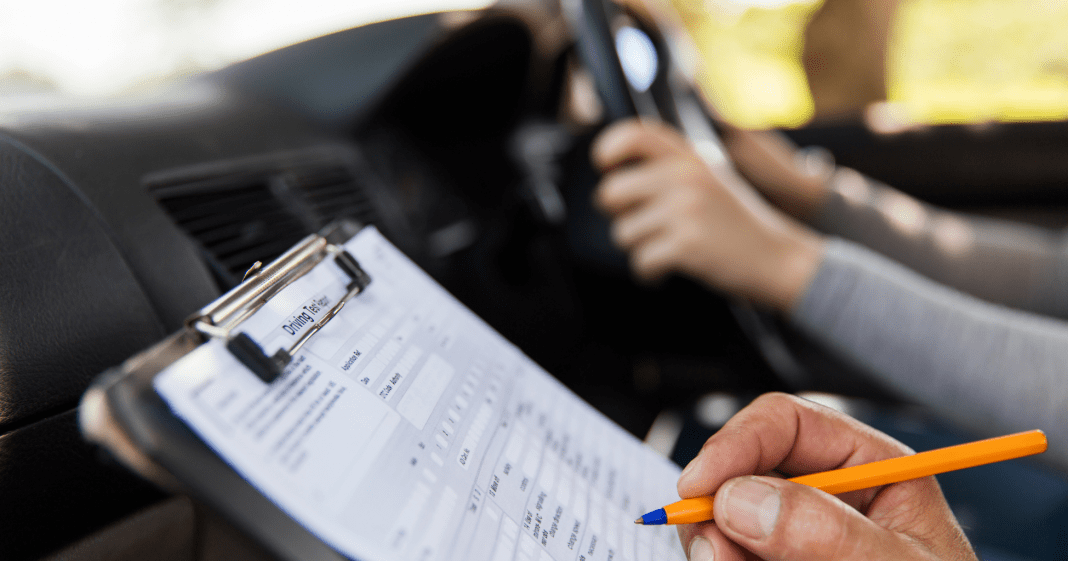Last Updated on February 25, 2025
Failing your driving test can be a tough experience, but it’s important to remember that it’s a common step in the journey to becoming a fully licensed driver. This blog aims to guide you through the next steps after a driving test fail, helping you to understand what went wrong, how to improve, and how to rebook your test when you’re ready. We’ll provide practical advice, insights into the driving test process, and address common questions and concerns that learner drivers may have.
If you have recently passed a driving test and want to know what to do, why not check out our other guide here.
Get a learner driver insurance quote today!
What to Expect Leading Up to Your Driving Test
The build-up to your driving test is an exciting yet nerve-wracking time. You’ve spent hours behind the wheel, learning the rules of the road, practising manoeuvres, and preparing for various traffic scenarios. Typically, you’ll have undergone professional driving lessons and have had practice sessions with a supervising driver.
In the days leading up to your test, it’s crucial to review the following:
| Test Routes | Familiarise yourself with the test routes in your area. Knowing these routes can help reduce anxiety as you’ll have a better idea of what to expect on your test. |
| Required Documents | Ensure you have all necessary documents, such as your provisional licence, appointment confirmation, and any other required paperwork. |
| Vehicle Check | If you’re using your own car, ensure it meets the test standards. This includes functioning lights, mirrors, and proper documentation (MOT, insurance, etc). |
What to Do After Failing Your Driving Test
Let’s take a look at some of the important steps you should consider taking if you fail your driving test:
Understand What Went WrongThe first step after failing your driving test is to understand the reasons behind it. Examiners provide feedback on both minor and major errors based on regulated driving test faults. Carefully review this feedback:
Major Faults: These are serious errors that could potentially cause danger to yourself or others. A major fault will result in an immediate fail.
Minor Faults: These are less serious mistakes but can add up. Accumulating too many minor faults can also lead to a fail. The maximum number of minors you are allowed in one test is 15 minors.
Take note of these points and use them to guide your practice sessions moving forward.
Practise More
If you have failed your test, it might be because you aren’t quite ready and need to practise more. Focus on the specific areas where you have made mistakes:
- Manoeuvres: Practise parallel parking, bay parking, and other required manoeuvres until you can perform them confidently.
- Traffic Situations: Spend time driving in various conditions (busy roads, quiet streets, different weather) to build your confidence and adaptability.
Regular practice helps to reinforce good habits and reduce anxiety ahead of your newly booked test.
Consider Professional Lessons
If you haven’t already, consider contacting your local driving school and taking additional lessons from a certified driving instructor, it can be incredibly beneficial:
- Targeted Guidance: Instructors can provide specific advice tailored to the mistakes you made in your test.
- Building Confidence: Regular lessons can help build your confidence and ensure you’re test-ready.
Stay Positive and Confident
Failing your driving test can be disheartening, but it’s important to maintain a positive outlook:
- Common Experience: Remember, many people don’t pass on their first attempt. It’s a common experience and part of the learning process.
- Focus on Improvement: Use this opportunity to become a better driver. Each mistake is a learning point.
Rebook Your Driving Test
Once you feel ready to rebook your driving test, you should consider the following:
- Waiting Periods: Check the mandatory waiting period before you can reapply. In the UK, you must wait at least 10 working days.
- Availability: Test slots can fill up quickly, so book your test as soon as you feel prepared

Practise Mock Tests
Mock tests are a great way to prepare for the real thing:
- Simulate Test Conditions: Have your instructor or a trusted, experienced driver conduct a mock test. Follow the test routes and adhere to the same conditions as the actual test.
- Feedback: Use the feedback from these mock tests to address any lingering issues.
Collingwood Insurance have collaborated with driving test experts RoadHow to bring the premium version of their app to all Collingwood Learner Driver customers completely free of charge. This app provides information on road signs, the highway code as well as hazard perception clips which can be used ahead of your theory test.
Stay Calm and Prepared
On the day of your retest, it’s crucial to remain calm and collected:
- Preparation: Ensure you have all necessary documents and arrive at the test centre early.
- Mindset: Approach the test with a positive mindset. Remember, you’ve prepared and practised extensively for this moment.
Learn from Experience
Each driving test, whether passed or failed, is a learning experience:
- Reflect: Reflect on your previous test and the feedback you received.
- Adjust: Adjust your practice routines and lessons based on this feedback to avoid making the same driving mistakes again.
Seek Support
Don’t hesitate to seek support from friends, family, or online communities:
- Encouragement: A support system can provide encouragement and advice.
- Shared Experiences: Hearing about others’ experiences can be reassuring and offer new strategies.
Consider a Different Test Centre
If you’ve failed multiple times at the same test centre, it might be worth considering a different location:
- Different Routes: A new test centre means different routes and possibly less traffic or less challenging conditions.
- Fresh Start: Sometimes, a fresh environment can make a big difference in your performance.

Source: https://www.gov.uk/government/statistical-data-sets/car-driving-test-data-by-test-centre
Looking Forward
How to Get Over Failing Your Driving Test
Dealing with a driving test fail can be challenging, but it’s important to move forward. Accept that setbacks are a normal part of learning and use this experience to grow and improve your driving skills. With determination and the right approach, you can turn this temporary obstacle into a stepping stone towards success:
| Accept It | Accept that failure is a part of learning. It doesn’t define your abilities as a driver. Recognise that many experienced drivers didn’t pass on their first attempt and that each test is an opportunity to improve. |
| Stay Motivated | Keep your end goal in sight – becoming a competent and confident driver. Remind yourself of the benefits of driving, such as independence and convenience, to maintain your motivation. |
| Use Resources | Utilise available resources, such as online tutorials, forums, and additional driving lessons. Engage with online communities for tips and moral support and consider professional lessons to target specific weaknesses. |
Why Did You Fail Your Driving Test?
Understanding why you failed is crucial for improvement. By identifying the specific reasons for your driving test failure, you can focus your efforts on addressing those areas. This targeted approach will help you become a more competent and confident driver, increasing your chances of passing the test on your next attempt:
Common Reasons: These can include poor observation, incorrect manoeuvres, hesitation, and not following traffic rules. Addressing these common issues through focused practice can significantly enhance your driving skills.
Personal Mistakes: Reflect on your specific errors. Did nerves get the better of you? Were there unexpected challenges? Identifying these personal mistakes can help you develop strategies to manage anxiety and better prepare for unexpected situations.
How Long After Your Driving Test Until You Can Reapply?
You can typically reapply for your driving test after a mandatory waiting period:
UK Regulations: In the UK, the waiting period is 10 working days. This gives you time to reflect and practise. Use this time to consolidate your learning and work on areas where you struggled.

If You Fail Your Driving Test, How Long Do You Have to Wait?
The waiting period can vary depending on your location:
Minimum Period: In the UK, you must wait at least 10 working days before rebooking your driving test. This mandatory period is designed to give you enough time to improve your driving skills.
Preparation Time: Use this time wisely to practise and address the areas where you previously struggled. Focus on turning your weaknesses into strengths, ensuring you’re better prepared for your next test attempt.
Conclusion
Failing your driving test is a temporary setback on the road to becoming a licensed driver. By understanding your mistakes, practising diligently, and approaching your next test with a positive mindset, you can improve your chances of passing. Remember, persistence and preparation are key to success.
FAQs
There is no limit to the number of times you can fail your driving test. Keep practising and improving until you pass.
Not necessarily. Test routes can vary even within the same test centre. It’s best to be prepared for different scenarios.
According to Gov.UK, you can appeal to a court if you believe your driving examiner did not follow the law in your driving test which resulted in a fail. If you do win your appeal you won’t ‘pass the test’ however the court can decide if you are allowed to take a test again for free or get a refund of your test fee.
You’ll need your provisional driving licence, your theory test certificate, and the confirmation of your test appointment. If using your own car for your driving test, ensure it meets the necessary requirements.
Practise mindfulness and deep-breathing techniques before and during your test. Ensure you’re well-rested and avoid caffeine right before your test. Confidence comes from preparation, so the more you practise, the calmer you’ll be.









